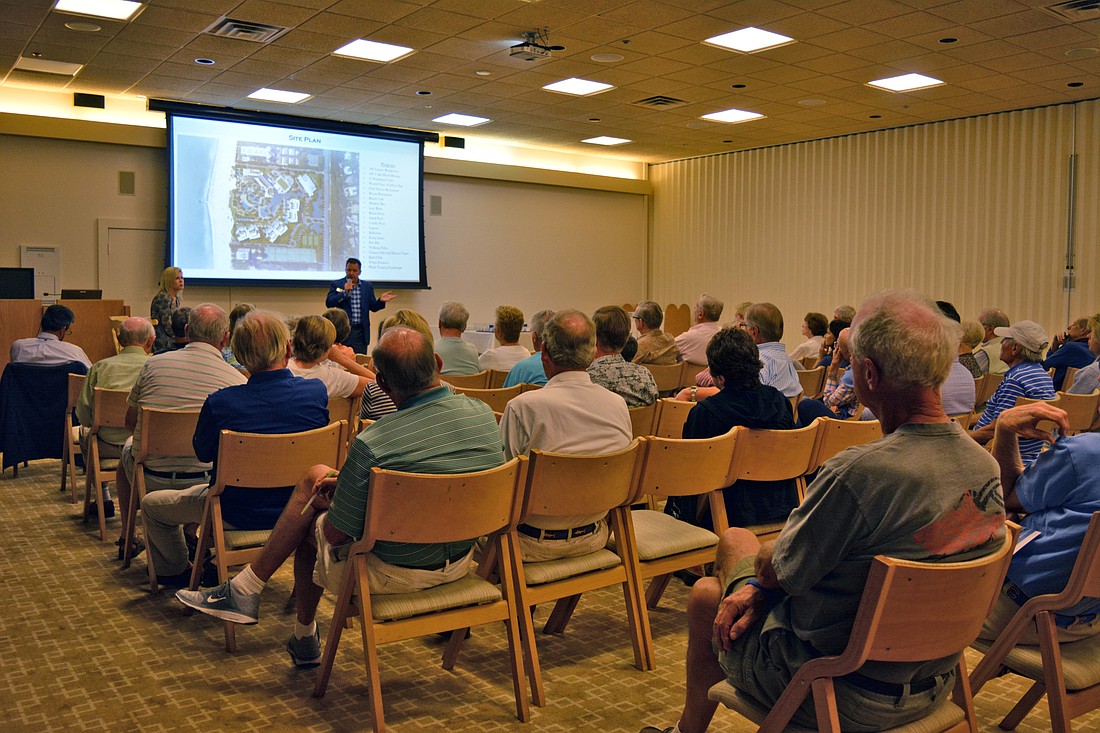- April 19, 2024
-
-
Loading

Loading

In front of more than 45 people gathered for a public forum last week, Unicorp National Developments President Chuck Whittall rolled out a surprising tidbit: The proposed $1 billion redevelopment of the Colony Beach & Tennis Resort will mean fewer cars on the road.
Specifically, 37 fewer during the peak traffic time of 4 p.m. to 6 p.m.
“Our project will actually help traffic, not hurt traffic,” he said at Temple Beth Israel on Thursday.
Whittall is conducting a series of informational forums around Longboat Key in anticipation of a March 14 referendum to pursue more density for the Colony redevelopment project. At last week’s session, Whittall discussed a roughly $6,000 traffic study by engineering firm Kimley-Horn and Associates, the results of which also were posted on the Colony webpage.
But how does the study come to its less-traffic-on-the-road conclusions?
For one, the analysis includes the 180 condominiums for which Unicorp is applying for a density increase to accommodate. The site is already entitled to 237 hotel rooms, and although the Colony has been closed for six years, those numbers aren’t taken into consideration in traffic studies.
“Usually when you have entitlements on a property, it’s already accounted for,” Whittall said after the meeting. “Even though you may not feel it on the road today, it is accounted for, so we’re really just accounting for those trips that we’ll add.”
Representatives from the Longboat Key Revitalization Task Force, which is spearheading efforts to push the Florida Department of Transportation to implement short- and long-term traffic solutions, declined to comment on the study.
“It’s in our best interest to handle traffic,” Whittall said. “If guests come here, and it’s a miserable experience, they’re not going to come back.”
As for the condos, Kimley-Horn used methods from the Institute for Transportation Engineers Trip Generation Manual to determine that the residential portion of the development would add 97 trips to Gulf of Mexico Drive during the peak afternoon hours.
But, thanks to several investments Unicorp plans — called traffic demand management strategies — that number drops by 134 cars.
Whittall has plans for a fixed-route trolley for all island residents that will run the length of Longboat and a shuttle service that will be available to pick up guests from the airport. Also, the resort will charge for parking, which Kimley-Horn engineers say will reduce new trips 27% compared with a free-parking arrangement.
And not included in the study: Whittall promised attendees at the meeting he would pay for improvements to the intersection of Cortez Road and 119th Street, such as a dedicated lane that would only stop for pedestrians to keep traffic flowing.
“In terms of a private entity paying for improvements, they would do this through our permitting process,” said FDOT spokesman Robin Stublen. “It happens all the time.”
Still, using the same methodology Kimley-Horn used on the study finds that 237 hotel rooms would add about 142 trips during the afternoon rush. That would mean 105 new vehicles on the road from 4 p.m. to 6 p.m.
But Whittall said he would also use his relationship with Gov. Rick Scott, which he forged while developing other Unicorp projects worth $3 billion, to influence the expediency of traffic improvements.
“When you build projects of this magnitude, you get a voice because you’re spending a lot of money,” he said.